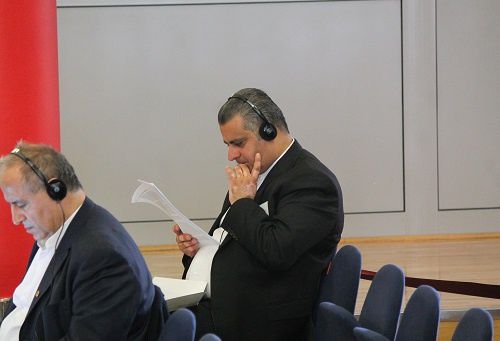The spokesman for the Catholic Church in Amman, Jordan has decried the continuous bloodshed in the Middle East, expressing his fear that refugees will develop an attitude of hatred and revenge.
“The main point I think is to stop the bloodshed, and then I think we will start to talk about the re-construction of Syria, the re-construction of Iraq, but we have to stop the bloodshed,” Fr. Rif’at Bader told CNA June 16. “It’s really a shame on the Middle East and on the world to allow such” violence to continue, he said. Present in Sarajevo, Bosnia for a June 16 — 17 conference addressing the theme “The Temptation of Violence: Religions between War and Reconciliation,” Fr. Bader is the spokesman for the Catholic Church in Jordan as well as director of the country’s Catholic Center for Studies and Media. He also played a key role in organizing the visit of Pope Francis last month. Speaking of the current situation in the Middle East, Fr. Bader explained that “Right now we have bloodshed in Iraq, in Syria and with these new stories of Daesh and Mosul,” and that because of this there is a great influx of refugees into Jordan who are fleeing the violence in their home countries. “I don’t say that we are suffering because of them, but we are suffering with them and for them because the situation is not easy in Syria, it’s not easy in Iraq,” he said. There are 300,000 refugees in Amman, with more than 1.3 million Syrians who have fled to Somal. Fr. Bader said that the number of refugees is concerning not because of financial, economic or water problems in Jordan, but because the camps are “not an institution of people but of families.” Of particular concern are children, the priest said, who do not have access to proper education and who often suffer psychological trauma. “Which future and which future generation will we have? I think they will grow up with the mentality of revenge, and of hatred," Fr. Bader said. In order to curb the development of this attitude, the spokesman said that it in addition to providing for their temporal needs, it is important to remember that “Everything is not in human hands,” but that “we have to put everything in God’s hands” as Pope Francis “did last week in the Vatican Gardens when he prayed with the Jewish and Israeli people and the Muslim people.” Drawing attention to how the Muslim Quran was read for the first time ever on Vatican grounds, Fr. Bader noted that “this is a good sign that we are doing our best as a Catholic Church, as Christians, to promote the values of justice, peace” and “contribution for the common good.” “No peace will be stable without justice, and no justice will be without forgiveness,” he said, adding, “will we have and will we see the horizon of peace build on justice and forgiveness? We have to pray to God to make this possible.”

